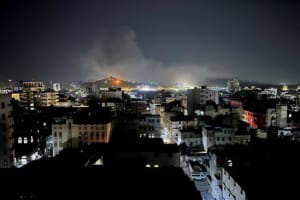Israeli PM says Netanyahu campaign video damages negotiations over maritime border
Lapid says Israel will start extraction at Israel's gas field, which has become platform for campaign season

Israel's natural gas field in the Mediterranean Sea – which has been the subject of Hezbollah threats – became fertile ground for campaign season, which has launched into high gear ahead of the Nov. 1 elections.
Benjamin Netanyahu – head of the Likud party and a top contender for prime minister in the Nov. 1 election – accused Prime Minister Yair Lapid of wanting to transfer a gas field to Lebanon that will give Hezbollah the billions needed to buy "thousands of rockets and missiles that will be aimed at Israeli cities."
“Lapid totally folded in the face of (Hezbollah Chief Hassan) Nasrallah’s threats,” he said in a video that was published on social media on Tuesday.
However, just the day before Lapid's office announced that Israel was going to start producing gas from the Karish field with or without an agreement with Lebanon on the maritime border – and despite threats from Hezbollah to attack the facility.
“The production of gas from the Karish rig is not connected to these negotiations. The production of gas from the rig will commence without delay, as soon as it is possible,” a spokesperson for Lapid’s office announced on Monday.
Lapid, who is in New York for the United Nations General Assembly, called the video message “terribly irresponsible.”
“He doesn’t know the details because he didn’t receive a security update. This damages Israel’s negotiations, and damages our security, diplomatic and economic interests,” Lapid said.
Overshadowing the news that a deal could be on the horizon are threats from the Lebanon-based, Iranian-sponsored terrorist organization Hezbollah. Led by Hassan Nasrallah, Hezbollah has threatened to attack the Karish field if Israel begins to extract gas from it.
On Friday, Nasrallah repeated his threat that the terrorist organization is ready to fire its missiles if Israel begins to extract gas.
“The red line to us is that there should not be extraction from Karish,” he said, according to Lebanon’s Naharnet news site. “We are following up on the negotiations and all our eyes are on Karish, and our missiles are locked on Karish.”
“As long as extraction has not started, there is a chance for solutions," Nasrallah said. “We will not allow that oil and gas be extracted from the disputed Karish field before Lebanon obtains its rightful demands.”
In August, Gantz warned Hezbollah that an attack on Karish could spark a war.
“The State of Israel is both ready to protect its assets and ready to reach a deal with the Lebanese government, via American mediation, on the Sidon deposit,” he said, in reference to another, nearby gas field known in Lebanon as Qana. “I believe that, in the future, there will be two gas platforms. One on our side, one on theirs. And I hope that we do not have to go through another round of confrontations before then.”
Lebanon claims that part of the Karish gas field falls in its territory, while Israel says it is fully in Israeli territorial waters and not within the area currently being negotiated by the two countries in United States-brokered talks.
Despite this, Israel made it clear that it considers an agreement with Lebanon “in a manner that will serve the interests of the citizens of both countries” to be “both possible and necessary.”
“Such an agreement will be greatly beneficial and strengthen regional stability,” the Lapid spokesperson said. The spokesperson also thanked Amos Hochstein, the U.S. mediator assisting in the negotiations over the border “for his efforts to bring about an agreement.”
Both Israel and Lebanon seem to think that a deal could be achieved in the near future.
Lebanese President Michel Aoun said in a tweet on Monday that the talks between the two countries – indirect talks that Hochstein has facilitated on and off for more than a year – are in their “final stages” and are being concluded “in a way that guarantees Lebanon’s rights to explore for gas and oil.”
Ynet reported an anonymous senior Israeli official similarly saying, “the feeling is that we are close to a deal.”
Meanwhile, Israel and Cyprus announced on Monday that they have made significant progress in the resolution of a long-running dispute between the two countries over a natural gas deposit offshore and would be looking to reach a deal quickly, especially as Europe is desperate for new energy sources in the current energy crisis.
The dispute is over Cyprus’ Aphrodite gas field, parts of which Israel says fall inside Israel’s nearby Ishai field.
“In light of the global energy crisis and the growing need for natural gas in Europe, I believe it is in our best interest that both parties should expedite a swift, transparent and fair settlement,” Cyprus Energy Minister Natasa Pilides and her Israeli counterpart, Karine Elharrar said in a joint statement.
“The trust between us and the continuation of fruitful cooperation in the various fields are very important for both parties,” they said.

The All Israel News Staff is a team of journalists in Israel.














